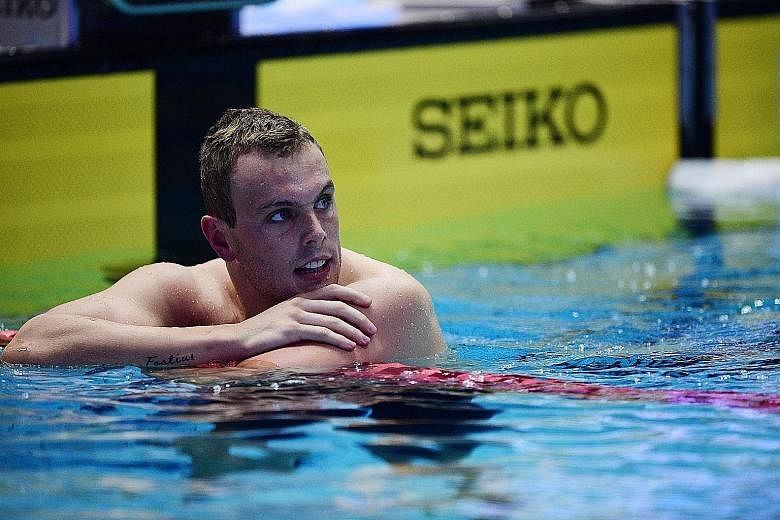MELBOURNE • When Olympic swimming champion Kyle Chalmers completed what he knew would be his final training session before the coronavirus shutdown, his overwhelming feelings were of sadness and the fear of what was to come.
Fear does not come easily to the Australian, who has endured two heart operations since winning the 100m freestyle gold in Rio 2016 and raises crocodiles and pythons as a hobby.
While it took some "processing" to digest that his dream of defending his Olympic title in Tokyo had been moved back 12 months, it was the prospect of not setting foot in a swimming pool for half a year that really had him rattled.
"That was my hugest fear, not being able to do what I love, which is swimming, and if I couldn't do that for six months, I was getting pretty edgy about it," the 21-year-old said.
"Unknowns are quite challenging, especially for competitive athletes whose days are mapped out from the minute they wake up to the minute they go to sleep."
He is one of thousands of athletes whose dreams have been put on hold following the postponement.
Olympic great Michael Phelps, who had battled anxiety and depression, voiced concern that the stress of the delay could take a toll on the mental health of athletes.
"I've tried to replay what I would be going through emotionally at this very time, if I was still competing," the American, who retired after the Rio Games with a record 28 medals - 23 of them gold, told NBC's Today show. "It's hard to really kind of comprehend it."
Health experts warn that prolonged isolation could take a big mental toll on people whose livelihoods and self-esteem are intrinsically linked to competition.
"A lot of athletes are still in an initial shock phase, probably confused and also with some relief after all the chaos," Caroline Anderson, a psychologist who works with professional and Olympic athletes in Australia, said. "Probably their two main coping strategies in life are having that competitive edge and being able to really push themselves physically for six-seven hours a day. They haven't got that any more, which is very difficult.
"They see themselves as athletes and sport is very tied up in that. Without the sport, the inability to train, these are absolutely risk factors."
Top athletes possess exceptional drive, talent and the ability to perform under relentless pressure but they are no less vulnerable to mental health problems.
London 2012 gold medallist Chad le Clos is trying to make the best of the situation by tethering himself to a bungee cord as he swims in his small backyard pool in Cape Town.
"It is not ideal, but you have to be creative given the limitations you have," the South African said.
REUTERS, AGENCE FRANCE-PRESSE

